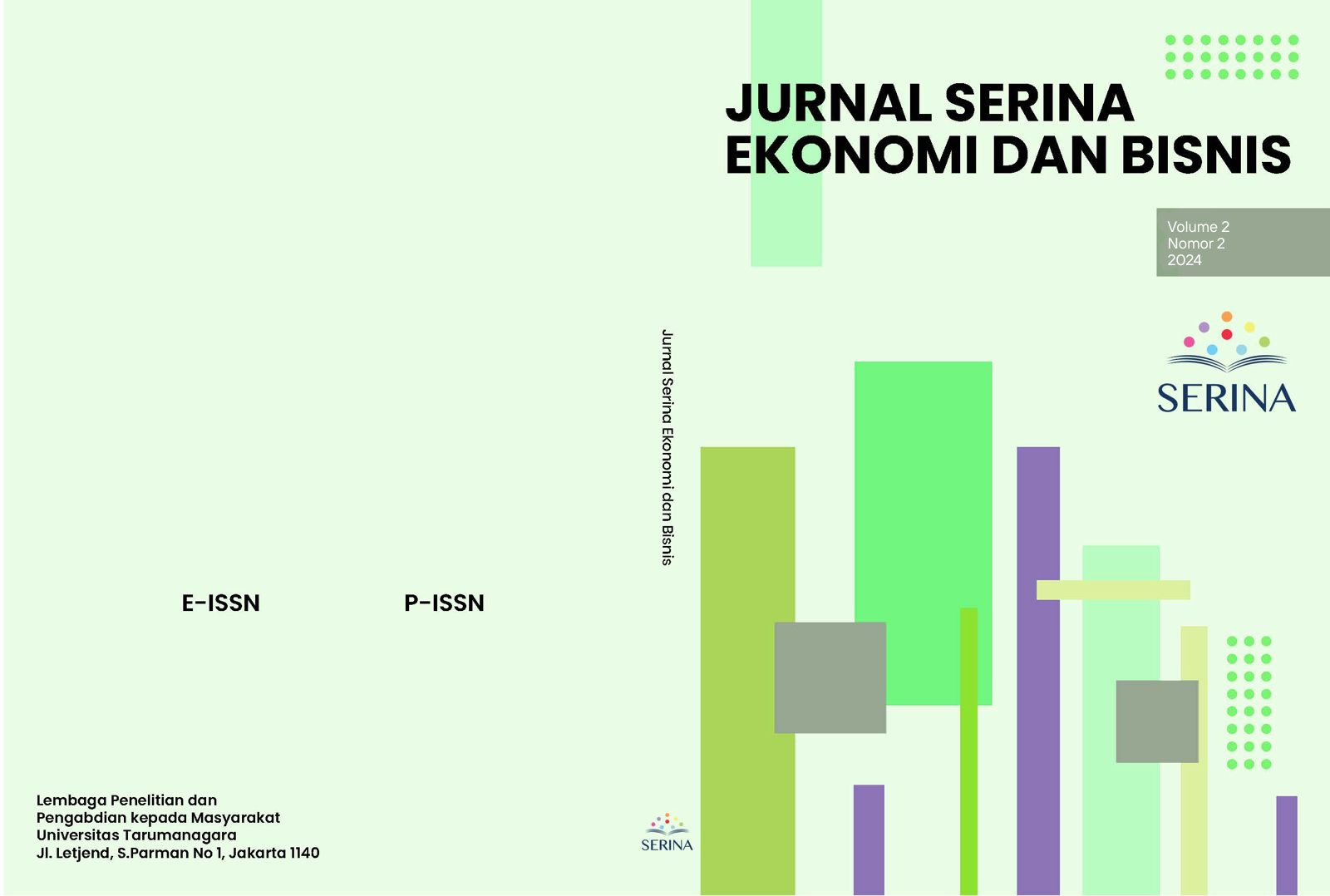PENGARUH E-SERVICE QUALITY DAN E-SATISFACTION TERHADAP E-LOYALTY KONSUMEN AMIRA PARIS DI JAKARTA BARAT
Main Article Content
Abstract
Penelitian dilangsungkan dalam usaha untuk menganalisis faktor-faktor yang memengaruhi e-loyalty dari konsumen Amira Paris di Jakarta Barat. Faktor yang mempengaruhi loyalitas pelanggan terhadap sebuah merek sangatlah beragam. Penelitian ini berfokus meneliti e-loyalty konsumen Amira Paris di Jakarta Barat menggunakan dua variabel yaitu e-service quality dan e-satisfaction. Data yang menjadi sumber dalam penelitian ini dihimpun menggunakan survei yang disebarkan secara daring menggunakan media google form kepada konsumen Amira Paris. Penelitian ini berhasil menghimpun 186 orang responden. Adapun hasil penelitian ini menemukan bahwa seluruh faktor yang diteliti yaitu e-service quality dan e-satisfaction memiliki pengaruh yang signifikan terhadap e-loyalty konsumen Amira Paris di Jakarta Barat. Kesimpulan ini didasarkan oleh nilai signifikansi variabel e-service quality yaitu sebesar 0.000 dan variabel e-satisfaction adalah sebesar 0.003 lebih kecil dari taraf signifikansi 0,05 sehingga dapat dikatakan bahwa kedua variabel memiliki pengaruh yang signifikan terhadap e-loyalty konsumen Amira Paris di Jakarta Barat.
ABSTRACT
The research was conducted in an attempt to analyze the factors that influence the e-loyalty of Amira Paris consumers in West Jakarta. Factors that influence customer loyalty to a brand are very diverse. This research focuses on examining the e-loyalty of Amira Paris consumers in West Jakarta using two variables, namely e-service quality and e-satisfaction. The data source in this study was collected using a survey distributed online using google form media to Amira Paris consumers. This study managed to collect 186 respondents. The results of this study found that all the factors studied, namely e-service quality and e-satisfaction, have a significant influence on the e-loyalty of Amira Paris consumers in West Jakarta. This conclusion is based on the significance value of the e-service quality variable, which is 0.000 and the e-satisfaction variable is 0.003 less than the significance level of 0.05 so that it can be said that both variables have a significant influence on the e-loyalty of Amira Paris consumers in West Jakarta.
Article Details
Section

This work is licensed under a Creative Commons Attribution-NonCommercial-ShareAlike 4.0 International License.
References
Anderson, R. E., & Srinivasan, S. S. 2003. E-Satisfaction and e-loyalty: A contingency framework. Psychology and Marketing, 20, 123–138.
Ashiq, R., dan Hussain, A. 2023. Exploring the effects of e-service quality and e-trust on consumers’ e-satisfaction and e-loyalty: insights from online shoppers in Pakistan. Journal of Electronic Business & Digital Economics.
Bernarto, I., Berlianto, M. P., Meilani, Y. F. C. P., Masman, R. R., dan Suryawan, I. N. 2020. The Influence of Brand Awareness, Brand Image, and Brand Trust on Brand Loyalty. Jurnal Manajemen 4(3), 412-426.
Cahyadi, H. Tarigan, R. P., Masman, R. R., Trisnawati E., dam Wijaya, H. 2024. Exploring the dynamics of fintech usage behavior moderated by customer characteristics in Indonesia. International Journal of Innovative Research and Scientific Studies 7(3), 997-1008.
Eryigit, C., & Fan, Y. 2021. The effects of convenience and risk on e-loyalty through the mediating role of e-service quality: A comparison for China and Turkey. Journal of International Consumer Marketing, 33(5), 613–626.
Jameel, A. S., Hamdi, S. S., Karem, M. A., & Raewf, M. B. 2021. E-satisfaction based on e-service quality among university students. Journal of Physics: Conference Series, 1804(1), 012039.
Kabir A. I. et al 2020. The emergence of E-commerce sites and its contribution towards the economic growth of Bangladesh: A qualitative study. Informatica Economica 24(3) 40-53
Myovella G., Karacuk M., Haucap J. 2020. Digitalization and economic growth: A comparative analysis of sub-saharan africa and oecd economies. Telecommunications Policy 44(2)
Ojasalo, J. 2010. E-Service quality: A conceptual model. International Journal of Arts and Sciences. 3(7), 127–143.
Oliver, R. L. (1999). Whence consumer loyalty? Journal of Marketing, 63(4), 33–44
Piercy, N. 2014. Online-service quality: Content and process of analysis. Journal of Marketing Management, 30(7), 747–785
Rahayu, R., Day, J., 2017. E-commerce adoption by SMEs in developing countries: evidence from Indonesia. Eurasian Business Review 7(1) pp 25–41
Saridakis, G., Lai, Y., Mohammed, A.-M., & Hansen, J. M. 2018. Industry characteristics, stages of E-commerce communications, and entrepreneurs and SMEs revenue growth. Technological Forecasting and Social Change 128 pp 56-66.
Shi, S., Mu, R., Lin, L., Chen, Y., Kou, G., & Chen, X. J. 2018. The impact of perceived online-service quality on swift Guanxi: Implications for customer repurchase intention. Internet Research, 28(2), 432–455.
Turban, E. 2010. Electronic commerce 2010: a managerial perspective. Upper Saddle River: Pearson Education.
Valvi, A. C., & Fragkos, K. C. 2012. Critical review of the e-loyalty literature: A purchase-centredframework. Electronic Commerce Research, 12(3), 331–378

